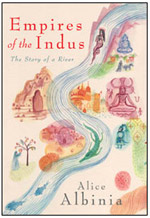Book Review: Empires of the Indus by Alice Albinia
 Title: Empires of the Indus
Title: Empires of the Indus
Author: Alice Albinia
Empires of the Indus is a story of people from the past and present of the Indus Valley. Author Alice Albinia makes the long journey from the delta of Indus at Karachi to its origin in Tibet, searching for the river’s past and reflecting on its present. She treads upstream slowly, often stopping for long periods and making long detours looking for a piece of history or culture.
Her journey begins at Karachi, where she spends her time meeting people who have lived here forever and also the ones who arrived from India after the British left, and exploring the changes that the city went through after Pakistan gained independence. She makes a slow journey upstream Indus on a boat visiting indigenous cultures and understanding their ways of life.
The story moves slowly into the past as she moves upstream. The clock moves back to the days of British Empire, unfolding the story of British struggle to explore and map the Indus and to conquer the local rulers. Further, it moves to the past where Islamic rulers dominated the landscapes and eventually to Alexander’s invasion to India. She also makes detours to the dangerous terrains in Afghanistan, crossing the border from Pakistan a few times. As she moves up the mountains, story shifts towards Buddhism and eventually to the aboriginal people and cultures. Later, the author spends considerable amount of time exploring the rock carvings and clues from paleolithic age when she is in Swat, Chitral and Ladakh. But once up in Tibet, her focus narrows down to merely making the adventurous journey to the source of Indus in the unforgiving terrain.
Throughout the book, the reader clearly sees the great commitment and effort that the author has made to extract the stories, meet the people who have information and visit every part of Indus Valley that has any significance to her chronicles. She researches through a lot of history to put her stories together and to ensure that no pieces of a known chronology has gone missing. Every chapter in the book – the sheedi community in Sindh, Kalash people in the mountains, Alexander’s march to India or on the rock carvings from the paleolithic age – are complete and well researched with all the information that one can ask for. Her narration is fluent and carries the reader upstream Indus along with her.
However, as one moves from chapter to chapter and from one part of the valley to the other, the reader feels a lack of continuity in the story. The initial chapters on history suddenly shifts to indigenous cultures in Sindh and before it is over, the story moves to the sufi saints and later to Alexander. Such sudden shifts are common all through the books, and just when you start lingering in a story, you are whisked away from it. And there are times when she entrenches into the depths of a topic so much that it appears more like a book of history than of travel.